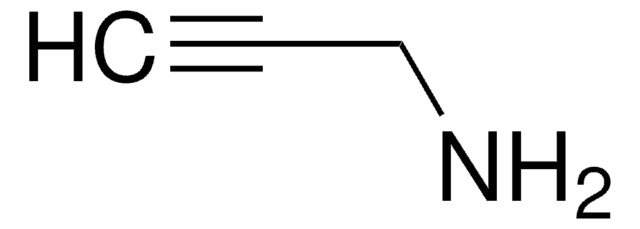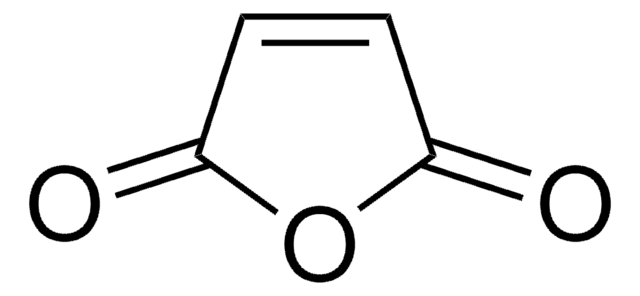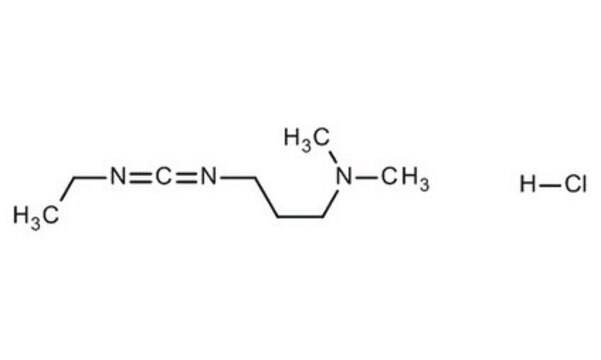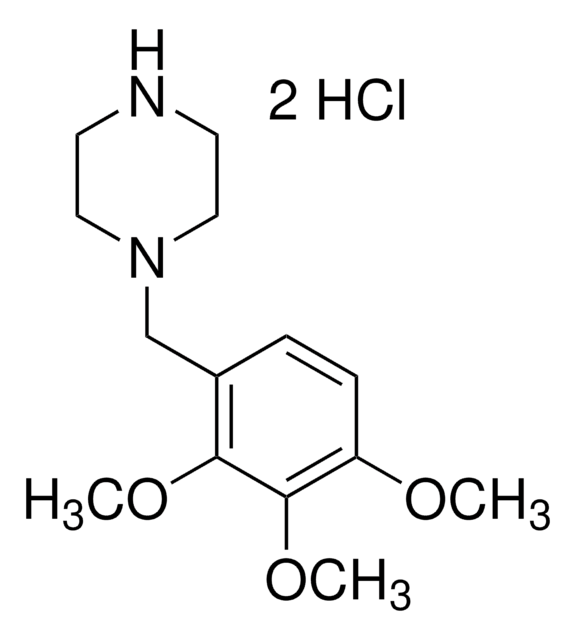91445
10,12-Tricosadiynoic acid
≥98.0% (GC)
Sinonimo/i:
Tricosa-10,12-diynoic acid
Autenticatiper visualizzare i prezzi riservati alla tua organizzazione & contrattuali
About This Item
Formula empirica (notazione di Hill):
C23H38O2
Numero CAS:
Peso molecolare:
346.55
Beilstein:
1880414
Numero MDL:
Codice UNSPSC:
12352100
ID PubChem:
NACRES:
NA.22
Prodotti consigliati
Livello qualitativo
Saggio
≥98.0% (GC)
Forma fisica
crystals
Condizioni di stoccaggio
protect from light
Punto di fusione
56-60 °C
Gruppo funzionale
carboxylic acid
Stringa SMILE
CCCCCCCCCCC#CC#CCCCCCCCCC(O)=O
InChI
1S/C23H38O2/c1-2-3-4-5-6-7-8-9-10-11-12-13-14-15-16-17-18-19-20-21-22-23(24)25/h2-10,15-22H2,1H3,(H,24,25)
DIEDVCMBPCRJFQ-UHFFFAOYSA-N
Cerchi prodotti simili? Visita Guida al confronto tra prodotti
Descrizione generale
10,12-Tricosadiynoic acid, also known as Tricosa-10,12-diynoic acid, is a monomeric amphiphilic diacetylene fatty acid characterized by long paraffinic chains on both sides of the diacetylene moiety. This compound is often used in the synthesis of polymerizable monolayers and Langmuir-Blodgett multilayers.
Applicazioni
- Acid-responsive color transition in polymer assemblies: 10,12-Tricosadiynoic acid is employed in the development of acid-responsive polydiacetylene-Na(+) assemblies, showcasing a unique red-to-blue color transition. This property is significant for applications in smart sensors and visual indicators in various industrial processes (Saymung et al., 2024).
- Colorimetric sensing capabilities: The synthesis of polydiacetylene vesicles incorporating 10,12-Tricosadiynoic acid demonstrates their utility as colorimetric sensors. This application is particularly valuable in the detection of microbial peptides, contributing to advancements in food safety and pharmaceutical analysis (Yadav and Tiwari, 2021).
Codice della classe di stoccaggio
11 - Combustible Solids
Classe di pericolosità dell'acqua (WGK)
WGK 3
Punto d’infiammabilità (°F)
Not applicable
Punto d’infiammabilità (°C)
Not applicable
Dispositivi di protezione individuale
Eyeshields, Gloves, type N95 (US)
Scegli una delle versioni più recenti:
Possiedi già questo prodotto?
I documenti relativi ai prodotti acquistati recentemente sono disponibili nell’Archivio dei documenti.
I clienti hanno visto anche
Max Weston et al.
Analytica chimica acta, 1148, 238190-238190 (2021-02-01)
The incorporation of colorimetric sensors as quality indicators in food packaging is an exciting new area of research that could improve food management. The standard approach, however, demands a reliable interface between the sensor and the food and risks food
Lars Hoff et al.
Journal of surfactants and detergents, 14(4), 585-593 (2011-10-01)
The ultrasound contrast agents Echovist(®) and Levovist(®) (Bayer AG, Schering AG, Germany) are based on the release of gas bubbles from milled α-d-galactose. In diagnostic ultrasound, for this class of contrast agents, there is a need for prolonged contrast duration.
Sofiya Kolusheva et al.
Sensors (Basel, Switzerland), 12(5), 5572-5585 (2012-07-11)
Non-invasive detection and monitoring of lethal diseases, such as cancer, are considered as effective factors in treatment and survival. We describe a new disease diagnostic approach, denoted "reactomics", based upon reactions between blood sera and an array of vesicles comprising
Roberto Diego Ortuso et al.
Soft matter, 13(8), 1728-1736 (2017-02-07)
We have demonstrated colorimetric and fluorescence detection of a peptide, melittin, based on polydiacetylene (PDA) made of 1,2-bis(10,12-tricosadiynoyl)-sn-glycero-3-phosphocholine (DC(8,9)PC). The PDA used in this work has a phosphocholine headgroup, which mimics peptide-cell membrane interactions better than the conventional PDAs with
Manoj Kumar Yadav et al.
Applied biochemistry and biotechnology, 182(1), 142-154 (2016-11-16)
The colorimetric assay is phospholipid/polydiacetylene vesicle-based assay used for the detection of membrane-acting peptides. Bacteriocins and halocins are antimicrobial peptides known to kill target cells by membrane disruption. Therefore, the assay was applied for high-throughput (HTP) screening of bacteriocins and
Il team dei nostri ricercatori vanta grande esperienza in tutte le aree della ricerca quali Life Science, scienza dei materiali, sintesi chimica, cromatografia, discipline analitiche, ecc..
Contatta l'Assistenza Tecnica.











